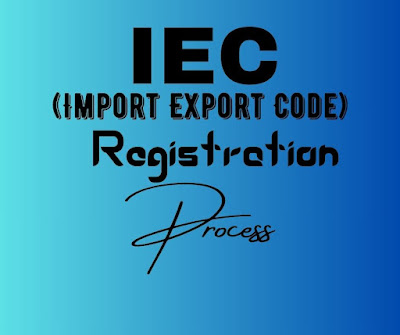IEC (Import Export Code) registration in India is a unique 10-digit code issued by the Directorate General of Foreign Trade (DGFT), Ministry of Commerce and Industry, Government of India. IEC is mandatory for individuals and businesses engaged in import and export activities in India. It acts as a license for undertaking international trade transactions.
Here's an overview of the IEC registration process in India:
Eligibility for IEC Registration:
- Any individual, company, partnership firm, LLP, or any other legal entity engaged in import or export activities is eligible to apply for IEC registration.
Benefits of IEC Registration:
- IEC is a prerequisite for customs clearance for import/export shipments.
- It helps businesses avail various benefits and concessions under the Foreign Trade Policy.
- It enables businesses to open an international bank account and receive foreign currency payments.
- It allows businesses to participate in international trade events and exhibitions.
IEC Registration Process:
Online Application:
- IEC registration is done through the DGFT's online portal (https://www.dgft.gov.in/).
- The applicant needs to fill out the prescribed application form (Aayaat Niryaat Form - ANF 2A) and submit it along with the required documents.
Documents Required:
- Passport-sized photograph of the applicant (in the case of individuals).
- PAN (Permanent Account Number) of the applicant.
- Details of the firm, such as its constitution, name, address, and contact information.
- Bank account details of the applicant.
- Other documents as required by the DGFT.
Digital Signature:
- The application must be digitally signed by the applicant using a valid Digital Signature Certificate (DSC).
Submission and Fee Payment:
- The completed application, along with the necessary documents, should be submitted online.
- The applicant also needs to pay the required fee for IEC registration.
IEC Issuance:
- Once the application is verified, the DGFT will issue the IEC certificate containing the unique 10-digit IEC code.
Validity and Renewal:
- IEC is typically valid for a lifetime and doesn't need to be renewed.
- However, it's important to keep the IEC details updated with the DGFT in case of any changes.
Amendment and Surrender:
- If there are any changes in the details provided during IEC registration, the applicant should promptly inform the DGFT.
- In case the IEC is no longer required, it can be surrendered to the DGFT.
IEC registration is a crucial step for businesses looking to engage in international trade activities. It's important to ensure accurate and complete documentation during the application process and to comply with any changes or requirements from the DGFT. Consulting with professionals or referring to official resources can provide the most accurate and up-to-date information on IEC registration procedures in India.









